Why Do My Gums Bleed During Teeth Cleanings?
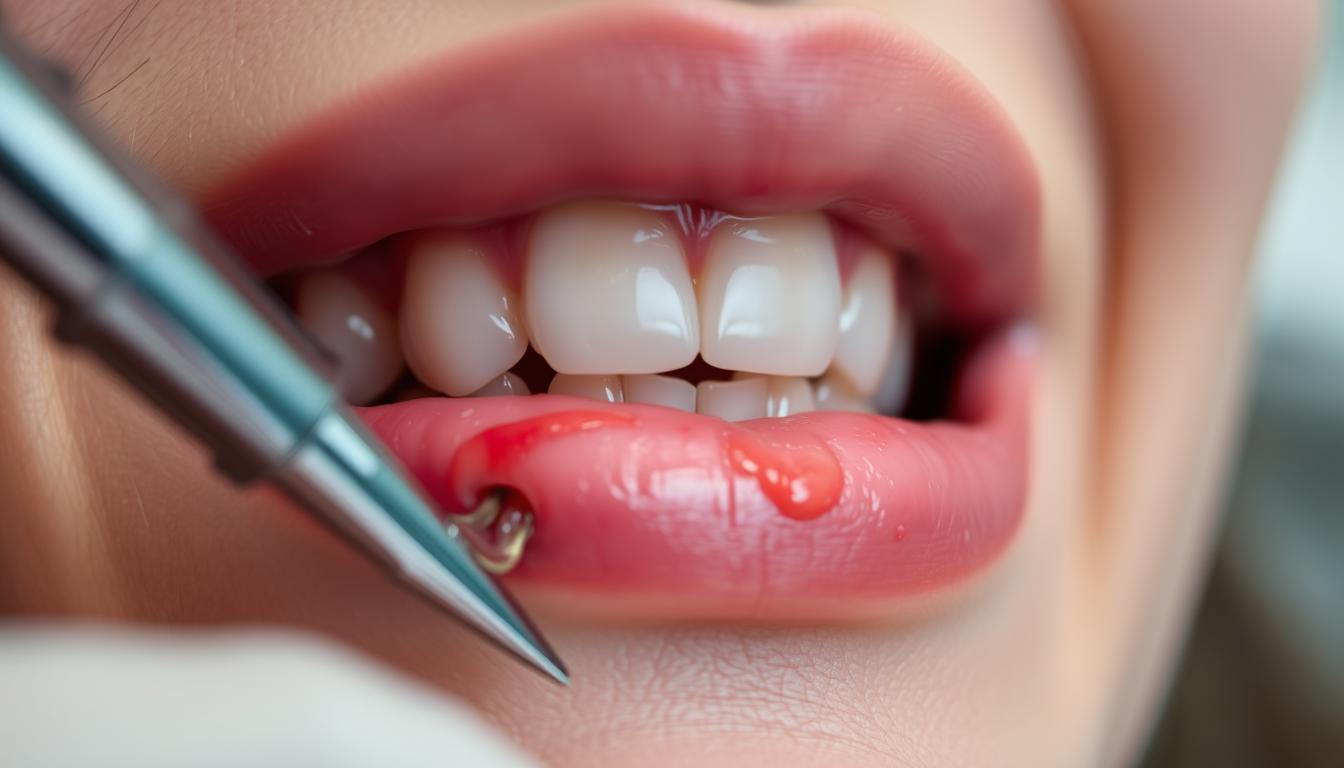
Many adults often worry about gum bleeding during teeth cleanings. The CDC notes nearly half of American adults over 30 have periodontitis. This highlights the need to understand gum bleeding during cleanings. Bleeding gums can hint at gum disease like gingivitis, poor flossing habits, medication side effects, or even dry mouth.
Bleeding during a dental cleaning can actually tell us about our gum health. Ideally, healthy gums shouldn’t bleed during a cleaning. This signals a need for a closer look by a professional. By talking to a dentist, you can learn what to expect and how to stop bleeding gums. Good dental habits and maybe some treatments can make your gums healthier and stop the bleeding. Realizing “Why do my gums bleed during cleanings?” is an important question for your oral health.
Key Takeaways
- Nearly 47.2% of American adults have periodontitis, which may cause bleeding gums.
- Healthy gums typically do not bleed, indicating the need for preventive care and treatment.
- Understanding gum bleeding during cleanings is crucial for diagnosing and managing gum diseases.
- Comprehensive dental assessments can identify causes of gum bleeding, paving the way for proper care.
- Effective oral hygiene can help prevent and decrease the likelihood of bleeding during teeth cleanings.
Understanding Gum Bleeding: An Overview
Bleeding gums during dental cleanings can often point towards potential underlining gum conditions, emphasizing the necessity of a detailed understanding of gum health. It is imperative to consider bleeding gums not just as a harmless one-off occurrence but as a crucial indicator that necessitates immediate attention and action.
What Is Gum Bleeding?
Gum bleeding, particularly noticed during dental cleanings, is commonly triggered by inflammation caused by accumulated plaque or tartar at the gum line. If left untreated, this inflammation can escalate into more serious gum diseases, affecting overall oral health. Understanding gum bleeding during cleanings starts with recognizing these signs as vital for preventive measures.
Importance of Gum Health
Maintaining gum health during dental cleanings is vital as it mirrors and impacts overall health. Gum diseases are linked to several systemic conditions including diabetes and cardiovascular diseases, making gum health paramount to general well-being. Efficient management of gum health helps in preventing more severe health issues and fosters a better quality of life.
| Condition | Impact on Gum Health |
|---|---|
| Plaque Build-Up | Leads to gum inflammation and bleeding |
| Gingivitis | Initial stage of gum disease, reversible with proper care |
| Periodontitis | Advanced gum disease, may result in tooth loss and require surgical interventions |
Common Causes of Bleeding Gums
Bleeding gums during dental cleanings can be caused by several factors. Knowing these can help prevent gum bleeding and keep your mouth healthy.
Gum Disease: Gingivitis and Periodontitis
Gum disease is a big reason for bleeding gums. It starts as gingivitis with gum inflammation from plaque. If not treated, it becomes periodontitis, damaging bone and causing tooth loss. Good cleaning habits help prevent and manage gum bleeding.
Hormonal Changes and Bleeding Gums
Hormonal changes can make gums bleed more easily. For example, pregnancy increases hormone levels, making gums more sensitive and likely to bleed. It’s important to know this to better care for your mouth during such times.
Medications That Affect Gum Health
Some medicines, like blood thinners, affect how your blood clots. This can lead to more bleeding during dental work. Talking about your medicines with your dentist helps customize your gum care.
| Condition | Impact on Gums | Management Strategies |
|---|---|---|
| Gingivitis | Mild to moderate inflammation and bleeding | Regular professional cleaning and improved home care |
| Periodontitis | Severe inflammation, bone loss, potential tooth loss | Advanced treatments, potentially including surgery |
| Pregnancy | Increased sensitivity and bleeding likelihood | More frequent dental check-ups and gentle cleaning practices |
| Medication (Blood thinners) | Increased bleeding tendency | Consultation with healthcare providers to adjust medication if necessary |
Understanding the causes of gum bleeding helps everyone. It means we can take steps to prevent it. This keeps our mouths comfortable and healthy in the long run.
Role of Dental Cleanings in Gum Health
Dental cleanings are very important for keeping gums healthy. This is especially true for people who often have bleeding gums during dental cleaning. Getting your teeth cleaned by a professional helps control plaque. Plaque can lead to gum disease if not managed.
Even though it may seem routine, dental cleaning is key to preventing gum disease. It removes tartar that brushing can’t get rid of. This cleaning reduces gum swelling. Sometimes, it might even cause bleeding gums during dental cleaning.
It’s important to know how much professional cleanings help your gum health during dental cleanings and overall mouth health. They don’t just clean. They also let dentists find early gum disease signs. This can be missed when you just care for your teeth at home.
| Benefits of Dental Cleaning | Impact on Gum Health |
|---|---|
| Removal of Plaque and Tartar | Prevents gum disease progression |
| Spotting Early Signs of Issues | Early intervention to mitigate serious gum problems |
| Fostering Better Blood Flow to Gums | Enhances healing and health of gum tissues |
| Professional Guidance on Oral Care | Improves daily oral hygiene practices |
Seeing bleeding gums during dental cleaning might worry you, but it shows why these cleanings are needed. They are crucial for gum health. Regular cleanings keep gums in good shape. This helps them support your teeth well.
Identifying Symptoms of Gum Disease
Gum disease is common and can lead to big problems for your mouth if not caught early. It’s important to notice if your gums bleed when you’re getting your teeth cleaned. Knowing the early signs of gum problems helps you stop bigger issues, like periodontitis. This part talks about these early signs and when you should see a dentist.
Recognizing Early Signs of Gum Problems
The first signs of gum disease might not be very noticeable, but they can get worse quickly if you don’t take care of them. You should watch out for:
- Persistent bad breath that brushing or mouthwash doesn’t fix.
- Gums that are red, swollen, or tender.
- Bleeding when you brush, floss, or sometimes for no reason at all.
It’s really important to know these signs to keep your gums healthy. Plus, we’ll share some tips to help avoid bleeding gums when you clean your teeth.
When to See a Dentist
It’s very important to see a dentist if you notice things like:
- Bleeding gums for no clear reason.
- Teeth and gums that are more sensitive than normal, especially to hot or cold.
- Pus around your teeth and gums, which means there might be an infection.
If you have these symptoms, you need to get help quickly. This helps you prevent more problems and get the right treatment from a dentist.
Tips for Maintaining Healthy Gums
Keeping your gums healthy is key to avoiding issues like bleeding when you get your teeth cleaned. By following good oral hygiene habits every day, you can make your gums stronger. This helps avoid pain and serious problems later on.
Regular brushing and flossing are very important for your gums. You should brush your teeth twice a day with fluoride toothpaste. Also, floss every day to get rid of plaque, which causes gum disease. This can prevent gingivitis, which, if ignored, might lead to worse problems.
It’s also crucial to choose the right products for your mouth. Use soft toothbrushes to keep your gums from getting irritated. Plus, mouthwashes that fight germs can help your daily brushing and flossing by cutting down on bacteria.
| Product Type | Features | Benefits |
|---|---|---|
| Soft-bristled toothbrush | Soft nylon bristles, ergonomically designed handle | Gentle on gums, reduces risk of irritation |
| Fluoride toothpaste | Contains fluoride to strengthen tooth enamel | Helps prevent decay and protect gum health |
| Antimicrobial mouthwash | Alcohol-free formulations with essential oils or cetylpyridinium chloride | Reduces bacterial growth, freshens breath, and helps prevent plaque build-up |
Using these steps can help keep your gums healthy and prevent bleeding during cleanings. By adding these tips to your daily routine, you’re helping keep your mouth healthy. This decreases the chance of having gum problems when you see your dentist.
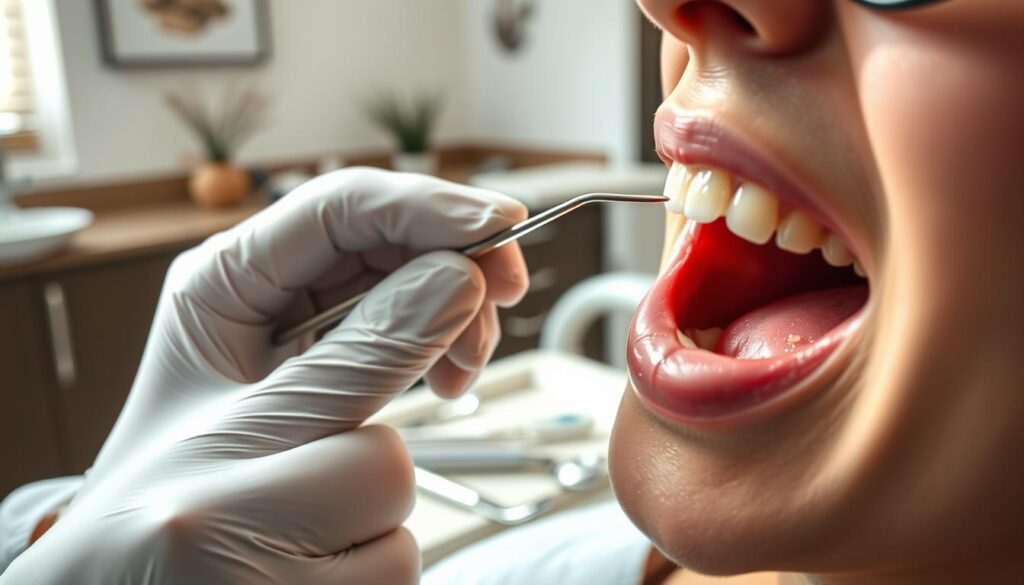
The Impact of Poor Oral Hygiene
Poor oral hygiene is a big reason why gums might bleed during teeth cleanings. Not brushing and flossing daily lets plaque, a sticky bacteria film, build up. This can make the gums inflamed, known as gingivitis, which might get worse without care.
To prevent gum bleeding during cleanings, it’s key to understand the link between dental neglect and gum issues. Let’s explore how ignoring dental care harms oral health over time.
How Neglecting Dental Care Leads to Bleeding
Ignoring oral care leads to plaque and tartar along the gums. This irritates the gums, causing inflammation and bleeding during cleanings. It also risks periodontitis. These issues make gums more sensitive and likely to bleed during dental work.
Long-Term Effects on Gum Health
Not caring for gums can cause lasting damage. Over time, ongoing inflammation becomes periodontitis. This condition makes gums and bone pull away from teeth, creating infected pockets. This can cause more bleeding, tooth loss, and other serious problems.
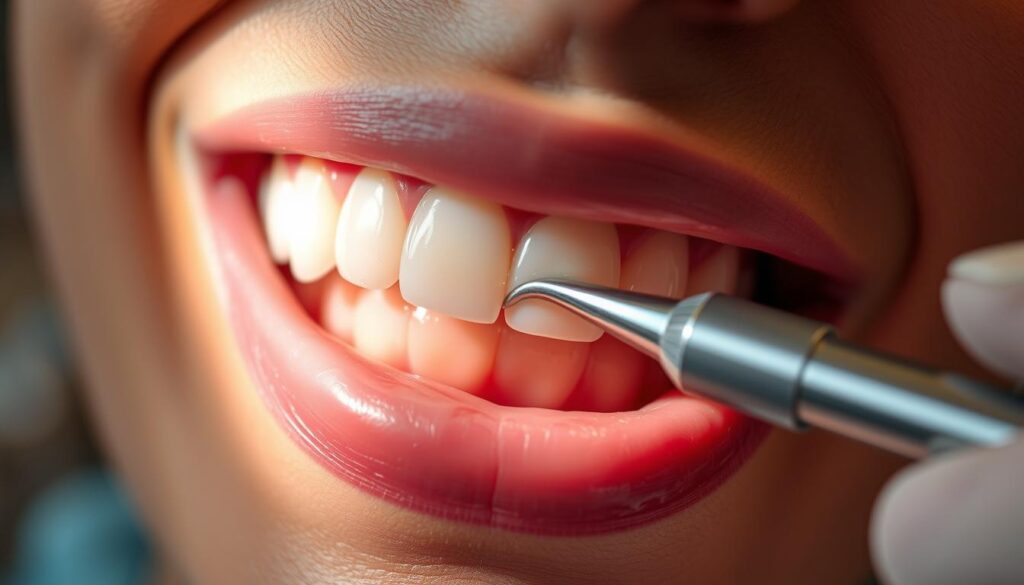
Keeping up with oral hygiene is crucial to avoid gum bleeding during cleanings. The long-term health of our mouths depends on regular dental care. So, it’s really important to have good oral hygiene habits for overall dental health.
Dietary Factors and Gum Health
Your eating habits are key to keeping your gums healthy, especially when it comes to dental cleanings. Eating right strengthens your gums and fights inflammation. This is important for stopping gum disease.
Key Nutrients That Promote Healthy Gums:
- Vitamin C: Essential for collagen production and the repair of gum tissues.
- Calcium: Strengthens the bone that supports the teeth which impact gums directly.
- Vitamin D: Facilitates calcium absorption and has anti-inflammatory properties.
On the flip side, some foods hurt your gum health.
Eating less sugar can greatly lower your risk of gum disease. Acidic foods should also be avoided as they harm enamel and gums.
Want to keep your gums healthy? Here’s what you should avoid:
- Sugary snacks and beverages
- Acidic fruits like lemons and limes
- Starchy foods that get stuck in your teeth, like white bread
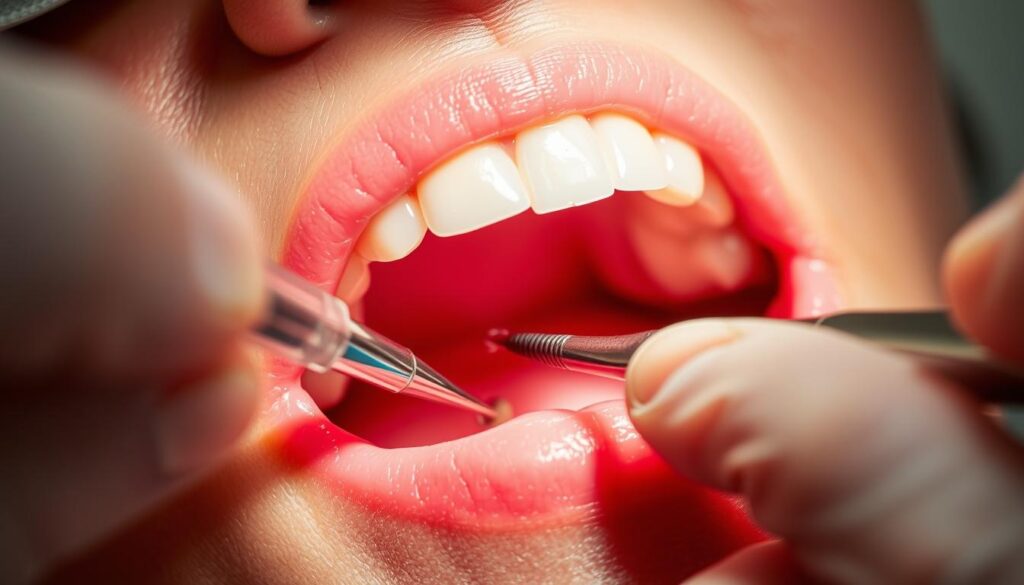
Choosing a diet rich in good nutrients and low in bad ones helps your gums. It stops problems you might have during dental cleanings. Eating well is a smart way to prevent gum bleeding and keep your mouth healthy.
Stress and Its Role in Gum Bleeding
When you wonder why do my gums bleed during teeth cleanings, think beyond just dental health. Stress affects our mouths too. It can make us forget to brush or floss properly. It can even cause us to grind our teeth more.
- Increased cortisol levels: Stress releases cortisol, which may weaken our gum’s defense against infection.
- Teeth grinding (bruxism): Stress can lead to more teeth grinding. This hurts our teeth’s support, causing gums to pull back and bleed.
To understand gum bleeding, we must see how stress changes our mouth’s health. Here are ways to reduce stress and protect our gums.
The Connection Between Stress and Oral Health
Long-term stress harms our immune system. A weak immune system fights off mouth bacteria poorly, causing gum problems. Stress makes us care less about brushing and flossing too. Good oral habits keep our gums healthy.
Coping Strategies to Reduce Stress
Managing stress is key for healthy gums. Here are good stress-reduction techniques:
- Mindfulness and meditation: These practices cut down stress, helping prevent mouth problems linked to it.
- Regular physical activity: Working out more boosts blood circulation, which is good for our gums and lowers disease risks.
- Adequate sleep: Sleeping well for 7-8 hours each night reduces stress and helps our body, including our gums.
Handling stress not only improves our overall health but also helps during dental cleanings and lessens gum bleeding chances. Using these coping strategies builds our defense against stress-related mouth issues. It proves how crucial stress management is for oral health.
The Importance of Regular Dental Visits
Keeping your mouth healthy is more than brushing and flossing every day. It’s key to visit your dentist often. This helps stop gum problems before they start, like bleeding gums during dental cleaning, and makes sure your gums stay healthy. Dentists can spot and fix issues early on during these visits.
Dentists and their teams clean your teeth better than you can at home. They get rid of plaque and tartar that your brush misses. This stops gum irritation that might make your gums bleed during a cleaning.
| Procedure | Purpose | Outcome |
|---|---|---|
| Exam and Consultation | To assess oral health and discuss concerns | Customized dental care strategy |
| Scaling and Root Planing | Remove tartar build-up below the gum line | Healthier gums, reduced risk of bleeding |
| Fluoride Treatment | Strengthen tooth enamel | Lower incidence of cavities and gum disease |
| Polishing | Remove stains and smooth the enamel | Brighter smile and smoother teeth |
Dentists recommend getting your teeth checked and cleaned twice a year. These visits keep your gum health during dental cleanings in check. They also stop issues that could cause bleeding gums during dental cleaning.
Regular dental visits focus on stopping problems before they happen. They keep your gums disease-free. Healthy teeth are part of your overall health.
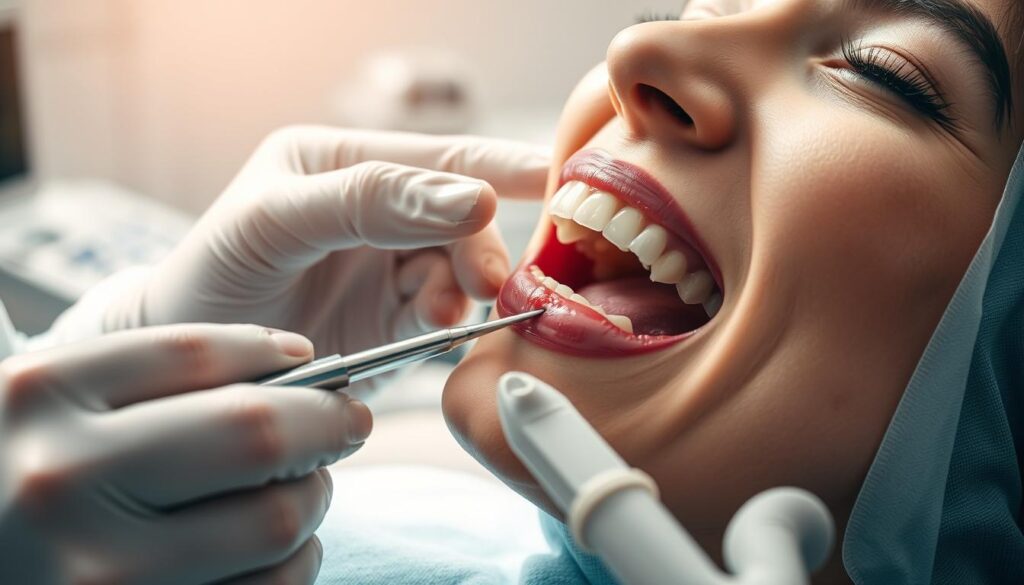
Home Remedies for Bleeding Gums
Looking into home remedies for bleeding gums can really help your oral health. Especially if you’re trying to keep your gums healthy between dentist visits. These easy remedies use natural ingredients, offering relief from gum swelling and bleeding.
Using certain tips regularly can lower discomfort and make your oral hygiene better. But remember, these home treatments should add to, not replace, visits to the dentist.
One of the simplest ways to help your gums is a saline mouthwash. Just dissolve salt in warm water and rinse your mouth well. This can cut down on swelling and keep your mouth clean.
Making pastes or rinses with healing herbs like turmeric or aloe vera is another good move. They have anti-inflammatory effects and can be put directly on the gums or used as a rinse.
| Home Remedy | Benefits | Application Method |
|---|---|---|
| Saltwater Rinse | Soothes inflamed gums, reduces bacteria | Rinse mouth twice daily with solution |
| Turmeric Gel | Anti-inflammatory, heals oral tissues | Apply directly on gums once daily |
| Aloe Vera | Antibacterial, soothes gums | Use as mouthwash or apply gel to gums |
Adding these remedies to your dental routine can be a natural, effective way to deal with bleeding gums. Still, it’s key to see how well they work for you and talk to a dentist if things don’t get better or if they get worse.
In the end, while home remedies for bleeding gums can give quick relief and help with oral health, going to the dentist regularly is still very important. These tips can prevent gum bleeding during cleanings and improve your daily oral care, keeping your gums healthy for a long time.
When to Seek Professional Help
Knowing why your gums bleed during cleanings is key for good oral health. It’s a sign that you might need to see a professional, especially if the bleeding doesn’t stop or you see other worrying signs.
It’s critical to understand when bleeding gums need a dentist’s attention. If your gums keep bleeding after cleaning, hurt badly, or look swollen and red, see a dentist right away. These could be signs of a serious gum problem like periodontitis, which needs quick and sometimes strong treatment.
Recognizing Severe Gum Issues
Big gum problems can show as more sensitivity, more redness, and bleeding easily when you brush or floss. If you also notice changing gum color or deep pockets forming between your teeth and gums, a dentist needs to check this. Waiting could make things worse, even lead to losing teeth and other health problems.
Questions to Ask Your Dentist
- What could be causing my gums to bleed excessively during cleanings?
- Are there specific treatments you recommend to prevent future issues with gum bleeding?
- How can I improve my daily oral hygiene routine to support gum health?
Having questions ready for your dentist helps you learn more about your oral health. It also leads to a care plan that meets your needs. This is a smart way to make sure you both have the same goals and clear up any confusion about taking care of your gums or any treatments you might need.
Fluoride and Gum Health
Dental medicine now sees the value of fluoride for gum health. Fluoride treatments help keep gum tissue healthy by making tooth enamel stronger. They also help fight gum diseases. This part talks about how fluoride is a key player in keeping gums healthy and avoiding dental problems.
How Fluoride Treatments Can Help
Fluoride treatments create a strong shield against germs that cause gum disease. They make the enamel tougher, fighting off damage from acids and bacteria. Plus, fluoride stops harmful bacteria from growing near the gums, preventing plaque. This helps avoid gingivitis, which can turn into worse gum diseases if not treated.
Benefits of Fluoride for Gums
Using fluoride for dental care brings big pluses for gums. It not only makes enamel stronger but also helps repair early tooth decay. This keeps gums healthy and ensures teeth stay healthy for a long time.
| Fluoride Treatment | Benefit |
|---|---|
| Topical Fluoride Varnishes | Immediate strengthening of enamel surface |
| Fluoridated Dental Products | Continuous protection against decay |
| Professional Fluoride Rinses | Inhibits bacterial growth at the gum line |
The Role of Genetics in Gum Health
Our genes play a big role in the health of our gums, mixing genetics with oral health outcomes. It’s important to know if our family history makes us more likely to have gum issues. This knowledge is key for stopping problems before they start.
Knowing our family’s gum health history helps us make better care plans. It also helps us handle risks linked to gum bleeding better. Gum bleeding concerns many, and it’s affected by both our daily care and our genes.
To see how big the genetic impact is, let’s look at different ways genetics affect gum health:
- Increased susceptibility to periodontitis: Some genes may make people more likely to get serious gum diseases, even with good oral hygiene.
- Variations in immune response: Genetic differences can change how well we fight off gum disease bacteria.
- Collagen production: Our genes can affect the strength of our gums by changing collagen quality and quantity.
If gum bleeding runs in your family, it’s crucial to watch your gums closely and prevent problems. Knowing your genetic risks lets you adjust your dental care to fit your needs. This reduces the risks linked to genetics.
Even though genetics are important, they don’t control everything. By understanding your family history and health, you can avoid or manage gum problems. Smart dental care can outsmart genetic risks.
Conclusion: Taking Action for Healthier Gums
In our talk about prioritizing gum health, we’ve covered how to spot and stop gum bleeding during dental visits. We also looked at the big role of good oral care. Understanding why gums bleed—from gum disease to bad diet and stress—is the first step in avoiding serious gum problems.
Good dental habits are key to preventing gum bleeding during dental cleanings. Brushing, flossing, and using the right mouth care products must become part of your daily routine. Eating well helps keep your gums healthy too. And don’t forget to manage stress to prevent it from making gum bleeding worse. You can learn more from this helpful article on dental cleaning frequency.
Finishing our discussion, it’s important that everyone keeps up with visits to their dentist. Dentists are key in finding and treating gum diseases early. With what we’ve shared, you can now make a personal plan for prioritizing gum health. This will protect you from many dental issues. Taking action early and getting the right care are crucial for keeping your gums healthy for life. Your gum’s health is a big part of your overall health, so starting better dental habits now is always a good idea.


